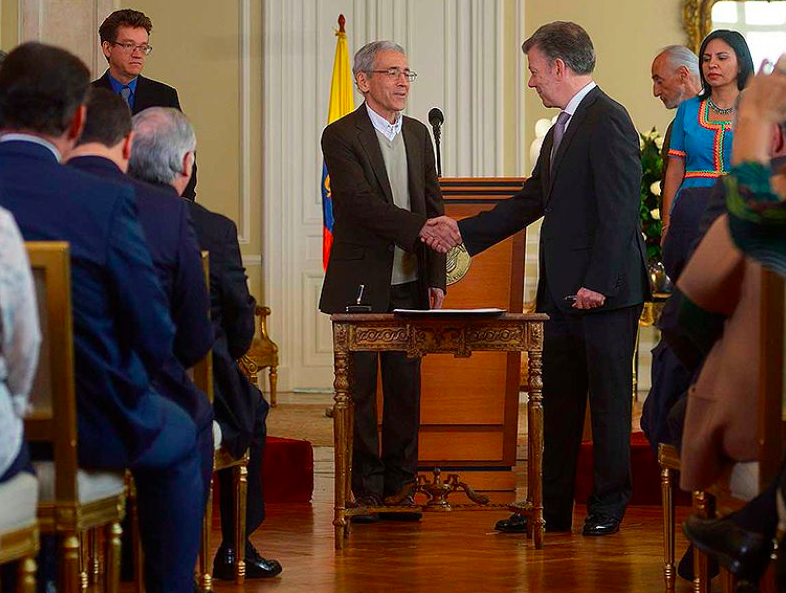
Photo courtesy of @JesuitasCol: Twitter.
An 11-member truth commission has officially begun investigation of war crimes committed during Colombia’s armed conflict.
The commission, made up of six men and five women chosen by the comité de escogencia; comprises sociologists, journalists, doctors, economists, priests and lawyers, who all officially took office on 9th May.
At an inauguration event that took place at Bogotá’s Casa de Nariño earlier this week, President Juan Manuel Santos commemorated what he labelled to be “a new step in the construction of peace and in respect of the rights of victims.”
According to the 2016 Peace Agreement, the Truth Commission proposes to “recognise, clarify and encourage the rejection of what has happened”.
However, the commission’s leader Jesuit priest Francisco de Roux, well-known for his work in defending human rights, told news outlet VOA Noticias that the real task will be to “recognise victims from all sides, dignify victims as citizens and recognise collective and institutional responsibilities, and society’s responsibilities”.
The investigation will be neither quick, nor easy. Investigators will be analysing five decades’ worth of human rights violations with a fine-tooth comb, in an armed conflict that left over 220,000 dead and seven million displaced.
According to President Santos, for this reason, the commission will be unable to hear all of the injustices committed over the years. However, at the commemorative ceremony marking the beginning of investigations, he did emphasise that it will help to “heal wounds.”
Every six months, the Truth Commission plans to issue a public report on their findings, to ensure that all information is kept transparent and available to all. As a priority, it intends to arrange private meetings between victims and perpetrators across the country.
Separate organisations, such as the 51-member peace tribunal (Jurisdicción Especial Para La Paz), began work back in March of this year. The tribunal will see military officials and FARC rebels who confess to their crimes be tried, but not imprisoned. Instead, they will be given community service-type sentences of up to eight years that focus on transforming parts of Colombia. Those who choose not to confess, or are found to not tell the truth about crimes they have committed, could face prison sentences of up to 20 years.
This level of ‘impunity’ was arguably one of the main factors that 50.2% of the Colombian population voted ‘no’ in the peace deal referendum back in October 2016. A significant proportion of citizens continue to believe that those who have committed atrocities should be imprisoned and not accepted back into normal civilian life, let alone allowed to enter the political sphere.
The first round of national voting ahead of this year’s elections seemed to reflect this. It showed that former FARC rebels are struggling for popularity, gaining only 0.34% of the total vote. The peace agreement, in any case, guarantees their political representation in the form of five seats in each of Colombia’s two parliamentary chambers.
However, FARC rebels are not the only ones liable to punishment for their crimes, and the Peace Accord recognises this. Members of the Colombian military will also be tried and sentenced as part of the JEP. Notably, a recent study co-conducted by ex-Police Colonel Omar Rojas Bolaños and historian Fabian Leonardo Benavides, has revealed that the falsos positivos scandal killed over three times the original numbers calculated by human rights groups. The scandal, which took place in the 2000s under the presidency of Álvaro Uribe, saw tens of thousands of civilians murdered by the military and disguised as FARC rebels, in order to boost war statistics.
The Peace Accord sets aside a separate special investigative unit to seek justice for the families and loved ones of those ‘disappeared’ in Colombia’s conflict. The Unidad Para La Búsqueda De Personas Dadas Por Desaparecidas stipulates that its mission is to “direct, coordinate and contribute to the implementation of humanitarian and extrajudicial actions for the search and identification of those presumed to have disappeared, that are found alive. In cases of death, the unit will work towards the location and dignified return of their remains.” In January, news outlet Semana reported that activity for this particular unit remains on hold, due to lack of funds. This delay was also confirmed in March, by the International Committee of the Red Cross.
Correction: An earlier version of this article mistakenly stated that JEP and the Truth Commission were the same entity. We apologise for any confusion this may have caused.





